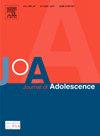Abstinence beliefs in early adolescence and sexual risk behavior two years later
Abstract
Introduction
The United States has the highest teen pregnancy rate and sexually transmitted infection rates among developed countries. One common approach that has been implemented to reduce these rates is abstinence-only-until-marriage programs that advocate for delaying sexual intercourse until marriage. These programs focus on changing adolescents' beliefs toward abstinence until marriage; however, it is unclear whether adolescents' beliefs about abstinence predict their sexual behavior, including sexual risk behavior (SRB). An alternative approach may be encouraging youth to delay their sexual debut until they reach the age of maturity, but not necessarily until marriage.
Methods
To address this question, we compare the longitudinal association between abstinence beliefs (i.e., abstaining completely until marriage) and beliefs about delayed sexual debut with subsequent SRB 24 months later. The harmonized data set included 4620 (58.2% female, Mage = 13.0, SDage = 0.93) participants from three randomized controlled trials attending 44 schools in the southern United States. Negative binomial regressions were employed to examine the association of abstinence until marriage beliefs and beliefs regarding delaying sex with SRB.
Results
We identified that beliefs supporting delaying sex until an age of maturity were associated with lower odds of engaging in SRB, such as having multiple sex partners and frequency of condomless sex, for both sexes. However, stronger abstinence beliefs had no significant associations with all SRB outcomes.
Conclusions
Findings suggest prevention programming that focuses on encouraging youth to delay sex until an appropriate age of maturity may be more effective at preventing SRB and consequent negative sexual health outcomes.

 求助内容:
求助内容: 应助结果提醒方式:
应助结果提醒方式:


